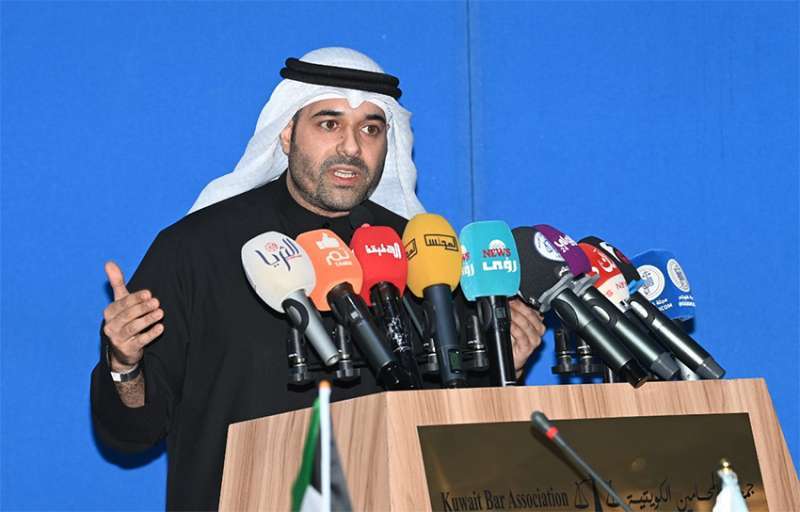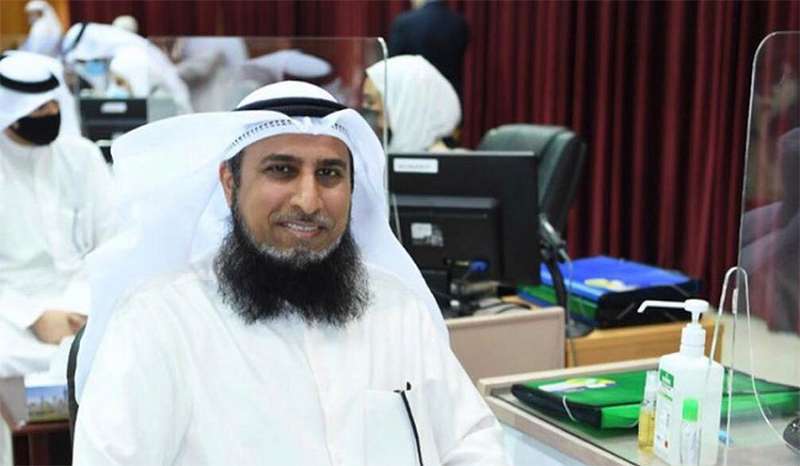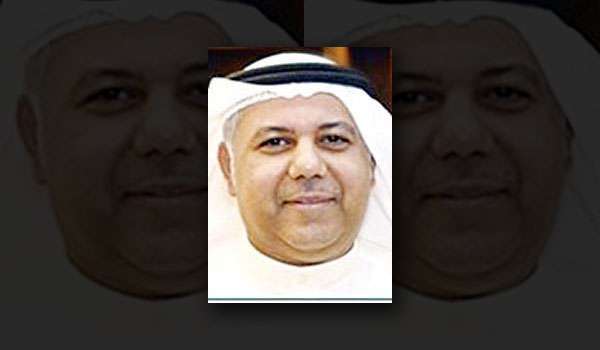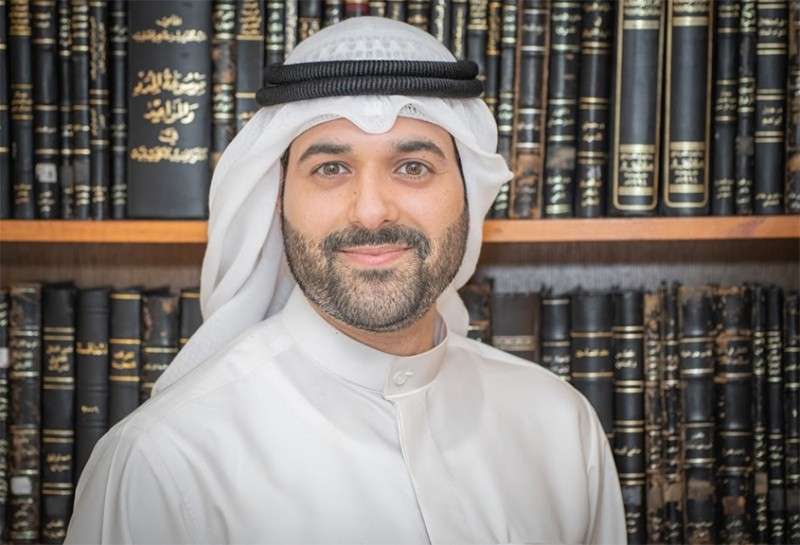Latest News
- IMF And World Bank Align On Kuwait's Economic Growth
- Nepalese Domestic Worker Commits Suicide
- Traffic Light Labeling For Packaged Foods Unveil By Kuwait
- Nazaha Unveils 49 Forged Certificates In 5 Years
- One Injured And Two Killed In An Abdali Road Accident
- Finance Ministry Approves ‘Afiya 4’ Health Insurance Tender With...
- KOC Clinches 63 Rig Contracts Worth $670 Million
- MoE Approves 169 Committees To Test 40,000 High School Students...
- Municipality Launches Campaign Against Unauthorized Car Awnings...
- Civil Service Commission Observes 170 Violations Across Ten Gove...
- Ministry Of Trade And Industry Cracks Down On Grill Pan Weight T...
- Ministry Of Health Considers Fingerprint System For Primary Heal...
Lawyer Dr Alkhateeb Calls For Amendment Of Article 60 Bis Of Penalty Code

Kuwait Bar Association held a panel discussion entitled “Conventions that need to be ratified —v a working day on enforced disappearance and combating torture” at the theater of the late Hamad Al-Issa at the Association’s headquarters.
The panel was moderated by the civil rights activist Hadeel Bouqreis, with the participation of the Chairman of the Central Committee of Kuwait Democratic Forum Bandar Al-Khairan, the civil rights activist Dr. Abdulaziz Al-Arayedh, assistant professor of criminal law at the Kuwait International Law College, Lawyer Dr. Fawaz Khaled Alkhateeb, the Kuwaiti human rights trainer, Engineer Adel Al-Qallaf, and lawyer Abdulaziz Abu Mijdad.
In the beginning, Dr. Abdulaziz Al-Arayedh spoke about the terminology related to the International Convention for the Protection of All Persons from Enforced Disappearance (ICPPED) and how it relates to the Convention against Torture, explaining the means for protecting the rights of the forcibly disappeared or those at risk of torture. Engineer Adel Al-Qallaf explained the ICPPED and how it relates to the United Nations Convention against Torture, discussing their articles, and Mr. Bandar Al-Khairan presented Examples of some cases in which violations occurred against the defendants. Then Dr. Fawaz Alkhateeb and Abdelaziz Boumejdad touched on the legal aspect of the defendants’ rights.
Freedoms
In turn, Dr. Fawaz Alkhateeb pointed out that there is an ongoing conflict between security, rights and freedoms in human history, and this is also reflected in the development of criminal law as it moved from the era of revenge to the era of punishment up to our current era, in which jurists seek to consolidate the concept of reform instead of punishment. Alkhateeb added that the founding council’s minutes of the Kuwaiti constitution revealed the concern of the security men about the crime and the concerns of the jurists over the violation that might occur on the accused, which was reflected in the articles of the Kuwaiti Constitution that prohibited torture, degrading treatment and abuse. It emphasized the principle of innocence of the accused and the importance of achieving a legal trial in which the necessary guarantees for exercising the right of defence were secured.
Alkhateeb added that the countries of the world unanimously agreed on the importance of establishing the foundations of justice and defence guarantees. As a result, the Working Group on Arbitrary Detention was established under Resolution 42 of 1991, issued by the UN Human Rights Council. The Working Group seeks to investigate cases of arbitrary arrest and detention and examine the legal basis for deprivation of freedom, as well as there must be a legal justification for forfeiture of liberty by a judgment or a decision from the investigation authority as per articles 12, 18, 19, 21, 22, 25, 26 and 27 of the International Covenant as well as in Articles Nos. 7, 13, 14, 18, 19, 20 and 21 of the Universal Declaration. He pointed out that the United Nations seeks to establish universal values and urges all states to fully abide by the international laws related to the enjoyment of a fair trial as stipulated in the Universal Declaration of Human Rights and the relevant international covenants accepted by the concerned states.
Alkhateeb indicated that the UN Human Rights Council has made clear the axioms that may sometimes be absent from the minds of security officers, including that the arrest must be based on a written arrest warrant and the suspect or accused must know the reason for his arrest immediately in accordance with the seventh principle of the basic principles and guidelines of the United Nations on remedies and procedures relating to the right of any person deprived of his liberty to appeal his detention (arrest) before the court; As well as Article (2.9) of the International Covenant on Civil and Political Rights, adding that knowing the reason for the arrest allows the person to challenge the legality of his detention as stipulated in Principle 10 of the Basic Principles and United Nations Guidelines on Remedies and Procedures, indicating that this order is stated in the Kuwaiti law, but not optimally applied, “The investigation authority renews the accused presentation day by day, which prevents the accused from directly seeking a legal remedy until a decision is issued to imprison him at the end of the period (21 days in felonies and10 days in misdemeanors).
Violates
Alkhateeb added that some departments Of criminal investigation take measures of solitary confinement against the accused is an apparent form of arbitrary detention that violates a person’s right to be recognized as a person before the law under Article (16) of the Covenant. The Covenant considers that solitary confinement in itself is torture, according to the decision of the General Assembly No. 60/148, indicating that solitary confinement is an exceptional measure that should not be used “and if necessary, then for the shortest period, given that detention of up to fifteen days amounts to torture and cruel, inhuman and degrading treatment as stipulated in UN resolutions.” Alkhateeb also indicated that depriving the accused of the aid of lawyers by the police at the beginning of the arrest is a procedure that is contrary to the articles of the Kuwaiti Code of Criminal Procedures, and it is inconsistent with the 17th and 18th principles of the set of principles related to the protection of all persons subjected to any form of detention, and it is inconsistent with Article 14 of the Covenant and Rule 61 of the Nelson Mandela Rules adopted by the United Nations in the Standard Minimum Rules for the Treatment of Prisoners.
Alkhateeb indicated that there are timid amendments by the Kuwaiti legislator towards these self-evident rights, starting with Law No. 17/1960 then Law No. 27/1965, Law No. 3/2012 and Law No. 35/2016 regarding arrest and detention and its duration and enabling the accused to contact a lawyer immediately upon arrest, and these texts are not applied in practice, claiming that the accused did not ask for a lawyer; it is ridiculous, given that even children know about the right to the presence of a lawyer in light of the publicly available visual programs. Alkhateeb believed that solutions to the dilemma of the confl ict between security and rights and freedoms must be legislative, as the police force is always under pressure of time to solve the mystery of the crime, as Kuwaiti law allowed the policeman to investigate for 48 hours in misdemeanours with the accused and 4 days in felonies. The police seek to maintain security by collecting the evidence to refer the suspect to the competent investigative authority to investigate the crime.
The accused is the weakest party in this equation because he has no contact with the outside world. The police must enable the suspect to reach for a lawyer, first of all, to prevent the deviation of the authority in inflicting coercion against the accused to extract a confession that may be unreal and may be the result of psychological or physical pressure, which contradicts the considerations and guarantees of justice as constitutional rights.
Rights
Alkhateeb concluded by submitting a proposal for a legislative amendment to Article 60 bis that all investigation procedures must be recorded visually and audibly in accordance with what is applicable in developed countries, and that the police authority must be obligated to read the basic rights of the accused by explaining his entitlement to refrain from answering any questions and to get a lawyer before answering, adding that this would activate enabling the accused to communicate with their families and lawyers; and in the presence of lawyers, “we will reduce the incidence of abuse and torture, and the recordings will be under the consideration and oversight of the fair judiciary whenever the defence requests to ensure that the procedures were in accordance with the legal frameworks, and that this would not conflict with the requirements of justice, rather, it will enhance it, as the investigation authorities must make use of modern technology and tools.”
The Kuwait Lawyers Association (Bar) announced later that it adopts the recommendations to amend Article 60 bis of the Penal Code by recording the investigation procedures visually and audibly and reciting the fundamental rights to the suspects and will communicate to the National Assembly to proceed with the necessary legislative steps in the near future.
SOURCE ARABTIMES
Trending News
-
 Eid Al Fitr 2024: Crescent Moon Not Sighted In Sau...
08 April 2024
Eid Al Fitr 2024: Crescent Moon Not Sighted In Sau...
08 April 2024 -
 Kuwait Implements Home Biometrics Services Ahead O...
14 April 2024
Kuwait Implements Home Biometrics Services Ahead O...
14 April 2024 -
 When Will Eid Al Fitr 2024 Take Place In Qatar, Ba...
08 April 2024
When Will Eid Al Fitr 2024 Take Place In Qatar, Ba...
08 April 2024 -
 On Sunday, The Meteorological Department Warns Of...
07 April 2024
On Sunday, The Meteorological Department Warns Of...
07 April 2024 -
 Kuwait Airways Provides Update On Flight Schedule...
14 April 2024
Kuwait Airways Provides Update On Flight Schedule...
14 April 2024 -
 Winners Of Kuwait National Assembly 2024 Elections
06 April 2024
Winners Of Kuwait National Assembly 2024 Elections
06 April 2024 -
 Kuwait Airways Introduces Convenient Home Luggage...
15 April 2024
Kuwait Airways Introduces Convenient Home Luggage...
15 April 2024 -
 Gathering For Eid Al-Fitr Prayers: Kuwaiti Citizen...
10 April 2024
Gathering For Eid Al-Fitr Prayers: Kuwaiti Citizen...
10 April 2024 -
 An Egyptian Expat Dies At Kuwait's Airport
11 April 2024
An Egyptian Expat Dies At Kuwait's Airport
11 April 2024 -
 Court Awarded Engineer KD24,00 For Unpaid Salaries
09 April 2024
Court Awarded Engineer KD24,00 For Unpaid Salaries
09 April 2024











Comments Post Comment